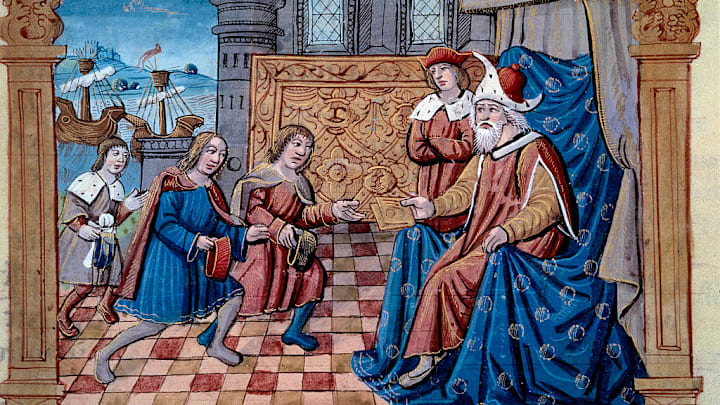In a lot of fairy tales, a disapproving father or a witch’s curse stops the princess from finding Prince Charming. But things were a little different in 13th-century Mongolia. Any single lad, regardless of status or wealth, could marry the khan’s daughter, Khutulun. There was just one caveat, which the princess herself decreed—you couldn’t take her hand in marriage until you took her down in a wrestling match. If you lost, you had to give her a handful of prize horses.
Sounds easy, right? Nope. After all, this is the great-great-granddaughter of Genghis Khan we’re talking about.
Born around 1260, Khutulun was an intimidating presence. According to The Travels of Marco Polo, the princess was “so well-made in all her limbs, and so tall and strongly built, that she might almost be taken for a giantess.” She was also the picture of confidence. She had mastered archery and horsemanship in childhood and grew up to become a fearless warrior. Whenever her father, Kaidu—the leader of the Chagatai Khanate—went to battle, he usually turned to Khutulun (and not his 14 sons) for help.
Nothing scared her. Not only did Khutulun ride by her father’s side into battle, she’d regularly charge headfirst into enemy lines to make “a dash at the host of the enemy, and seize some man thereout, as deftly as a hawk pounces on a bird, and carry him to her father,” Marco Polo wrote. The 13th- and 14th-century historian Rashid al-Din was more direct, writing that she "often went on military campaigns, where she performed valiant deeds.”
It’s no surprise that Khutulun had suitors lining up and down the street asking for her hand in marriage. The princess, however, refused to marry any of them unless they managed to beat her in a wrestling match, stipulating that any loser would have to gift her anywhere between 10 to 100 horses.
Let’s just put it this way: Khutulun came home with a lot of prize horses. (Some accounts say 10,000—enough to make even the emperor a little jealous.) As author Hannah Jewell writes in her book She Caused a Riot, “The Mongolian steppes were littered with the debris of shattered male egos.”
On one occasion, a particularly confident suitor bet 1000 horses on a match. Khutulun’s parents liked the fellow—they were itching to see their daughter get married—so they pulled the princess aside and asked her to throw the match. After carefully listening to her parents’ advice, Khutulun entered the ring and, in Polo’s words, “threw him right valiantly on the palace pavement.” The 1000 horses became hers.
Khutulun would remain undefeated for life. According to legend, she eventually picked a husband on her own terms, settling for a man she never even wrestled. And centuries later, her story inspired François Pétis de La Croi to write the tale of Turandot, which eventually became a famed opera by the composer Giacomo Puccini. (Though the opera fudges the facts: The intrepid princess defeats her suitors with riddles, not power slams.)
Read More About History:
A version of this story was originally published in 2018 and has been updated for 2025.
